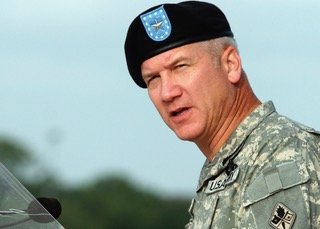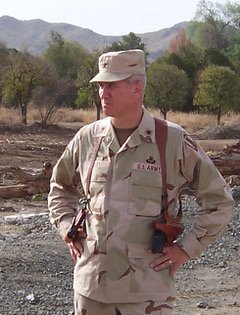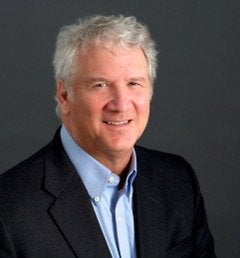Retired Brig. Gen. Jeff Foley grew up in a patriotic family, the son of a man who landed on the coast of France about a week into Operation Overlord, better known as the Battle of Normandy. The family always flew an American flag, and Foley achieved the rank of Eagle Scout as a teen.
But a career in the military was not part of his game plan.
“I was thinking going to West Point and playing football and getting an engineering degree and spending a tour of duty in the United States Army,” said Foley. “The Academy wasn’t all that much fun for most of the time I was there. But that was it got me into West Point. And I got an engineering degree. I left the academy figured I’d do my five years, go back to Cincinnati keep my season tickets to the Cincinnati Bengals, but it didn’t happen.”
MORE: Veterans Day Salute: Sam Anderson
It changed in 1984, in Uijeongbu, Korea when Foley had what he described as a “euphoric experience.”

At 28, he was a young captain with 220 soldiers assigned to him, and his commander was a couple of hours away.
“I had a combat mission. We were supporting the combined Field Army in a pretty dangerous place,” he remembered.
It was there that he realized the importance of his position to the well-being of his troops. They depended on him, and he was able to watch them grow and excel.
“It was like, ‘I don’t think I’m going to have this experience on the other side. The grass is not greener out there, from this leadership perspective – might be more money and all that, but I was never motivated by money,” he said.
By year’s end, he knew he didn’t want to quit.
“I said, ‘This is way too much fun. And I don’t want to leave it,’” he said.
[adrotate banner=”54″]
During that time, he also met Beth, the woman who would become his wife and partner in the military.

“She was an Army nurse at Fort Bragg. And we started romancing back then,” he said. “And together we said, ‘Let’s, let’s keep going.’ So, we ended up getting married, obviously. When I met my military spouse, I knew I had someone who understood the military, and of course, when you fall in love with someone like that, and you have a couple, it helps the cause.”
After Korea, assignments led to Fort Gordon, then Fort Leavenworth, Kan., and then to Germany. In 1990, when Saddam Hussein invaded Kuwait, Jeff Foley was deployed to Saudi Arabia.
“I was in the signal brigade. We were designing and orchestrating the whole communications architecture for the invasion of Iraq,” he said. “And that was a fascinating experience, had great, had great bosses, great people to work for and work with.”
Beth Foley stayed behind in Germany.
MORE: Veterans Day Salute: Rodney Tyson
“I think in many cases, it was more difficult for her and the folks who stay at home. We were so focused. We knew what we were doing. And we didn’t have a lot of communications back home,” he said. “So, they’re wondering, ‘What the hell’s going on over there? Are they safe? Are they in danger? Are they alive? Are they sick?’ What and the unknowns are what drives the stress at home. So, I think it was much harder for Beth and so many others than it was for me.”
Foley moved fom being a major in Germany, to Fort Hood, Texas, and a promotion to lieutenant colonel, to the Pentagon, the National War College in Washington, D.C., back to Fort Bragg when he was promoted to colonel, a return to Fort Gordon as Chief of Staff, then to the U.S. Central Command.
“I was promoted to brigadier general and went to U.S. Central Command as the senior communications guy on the CENTCOM staff,” he said. “The U.S. Central Command is the four-star regional combatant commander responsible for Iraq and Afghanistan. And we were in the middle of the war during all of that. So, I spent a fair amount of time in Southwest Asia. And after that, went to the Pentagon and my second tour of duty.”
[adrotate banner=”15″]
The road finally led back to Augusta, when he was named Fort Gordon’s commanding general, a post he held until his retirement in 2010.
He started Loral Mountain, a business to help people learn organizational leadership skills, harkening back to the euphoric experience in Korea, the joy of watching people grow into leadership roles.
Fort Gordon survived a Base Realignment and Closure Commission of 2004. Foley gives credit to the work done by then-Congressman Charlie Norwood, Fort Gordon Garrison Commander Col. Thom Tuckey and the CSRA Alliance for Fort Gordon, along with community support.
MORE: Veterans Day Salute: Luciano “Louis” Charles Graziano
Then the attention turned to growing the post, bringing in new missions.
“And we change the vision and mission of the Alliance. And then the drumbeat changed. We’re not trying to save for war, we’re trying to attract the cyber environment of the world,” said Foley. “And it was a wasn’t just a drumbeat. It was a very deliberate strategy, engagement with the United States Army, the Department of Defense, congressional perspective on let’s bring when the Army made the decision to create the cyber branch of the Army, that was almost a no brainer to bring it to Fort Gordon.”
Foley started out to be an engineer. Instead, he became a brigadier general, a leader of men and women. It is a path he encourages others to consider.
“I think it’s the military can be a wonderful experience,” he said. “To learn about your nation to learn what selfless service is to learn the values of the United States Army, have loyalty, duty, respect, selfless service, honor, integrity and personal courage and to learn how to live with others, and how to contribute to a cause greater than yourself. It’s a wonderful experience.”
Dana Lynn McIntyre is a Staff Reporter with The Augusta Press. You can reach her at dana@theaugustapress.com












